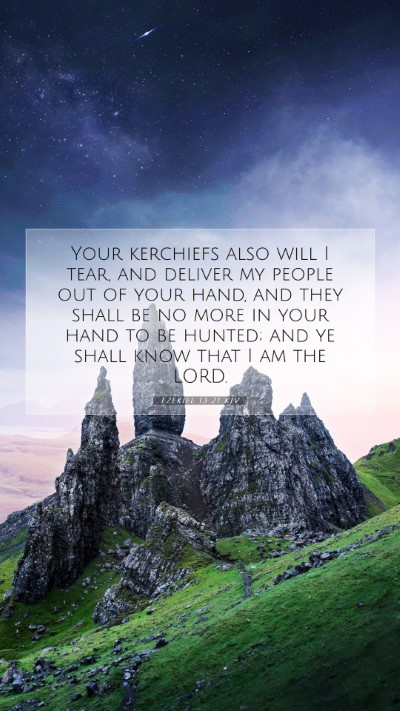Ezekiel 13:21 - Commentary and Interpretation
Bible Verse: Ezekiel 13:21
"And I will tear down your wall that you have painted with untempered mortar, and bring it down to the ground, so that its foundation will be uncovered; it will fall, and you shall be consumed in the midst of it. Then you shall know that I am the LORD."
Overview of Ezekiel 13:21
Ezekiel 13:21 is a prophetic declaration from God through the prophet Ezekiel. It addresses the false prophets of Israel and their misleading teachings. The verse emphasizes God’s judgment upon these leaders who have misled His people with false hopes and deceptive messages.
Meaning and Insights from Public Domain Commentaries
Matthew Henry's Commentary
Matthew Henry interprets Ezekiel 13:21 as a warning against the false prophets who construct a false sense of security for the people. He notes that their apparent strength, represented by the wall, is built on untempered mortar—symbolizing their lack of divine foundation. Henry highlights God's intent to dismantle their illusions, showing that without a firm foundation in truth, ultimate destruction will ensue.
Albert Barnes' Notes
Albert Barnes expands on the concept of “untempered mortar,” suggesting this signifies the inadequate and flawed teachings of the false prophets. He points out that without genuine revelation from God, any spiritual edifice constructed by these teachers will inevitably collapse. Barnes emphasizes that this act of tearing down will serve a dual purpose: it will reveal God’s power and expose the fallacy of their words.
Adam Clarke's Commentary
Adam Clarke delves into the specifics of the imagery used in this verse. He explains that the wall represents the confidence instilled in the people by these false prophets. Clarke suggests that the tearing down of the wall illustrates God’s judgment which ultimately aims to lead the people back to true repentance and recognition of His sovereignty. He insists that the phrase “Then you shall know that I am the LORD” serves as a reminder of the ultimate authority of God over the nations.
Key Themes and Applications
- The Nature of False Prophecy: This verse serves as a stark reminder of the consequences of following teachings that lack divine truth. Those looking for Bible verse meanings often find practical applications in their daily lives by being discerning about the messages they receive.
- God's Judgment: The prophetic declaration illustrates God's unwillingness to overlook deception. Understanding the seriousness of divine judgment helps Bible study groups engage in deeper discussions about integrity and truth in leadership.
- The Importance of True Foundation: The metaphor of the wall symbolizes the need for a solid foundation built upon Biblical truth, crucial for personal faith and communal worship. This theme resonates in online Bible study settings where participants seek to deepen their Bible verse understanding.
Related Bible Cross References
- Jeremiah 14:14: Highlights false prophets who speak visions from their own minds.
- Matthew 7:26-27: Jesus teaches about the wise man who builds his house on a rock versus the foolish man on sand.
- Lamentations 2:14: Discusses false visions and the consequences of ignoring the true word of the Lord.
Conclusion
Ezekiel 13:21 serves as a critical admonition regarding the dangers of false teachings and the vital necessity of grounding faith in God’s unchanging truth. As seekers delve into Bible study insights and engage in biblical exegesis, this passage underscores the importance of discerning divine truth from deception, allowing believers to apply these principles in both personal and communal discipleship.


